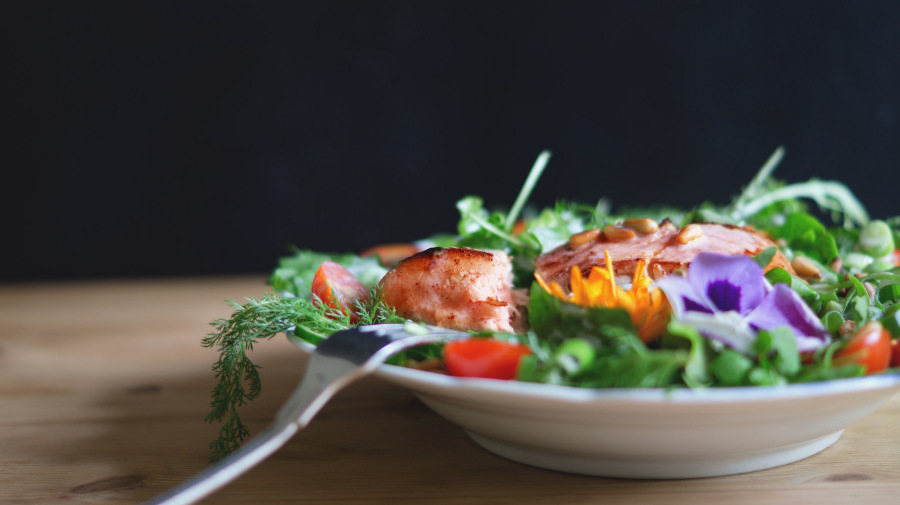In this article we look at what mindful eating is and what you can do improve how you eat and the process of mindful eating.
How we choose to eat can be equally, if not more important than what and when we choose to eat, because ultimately it impacts both.
How to eat goes far beyond the physical action of eating, such as chewing and the rate at which we eat. It reaches out to more psychological factors such as what we are thinking about before, during and after eating, and what environment we choose to eat in.
Although it might seem strange, these are crucial factors in establishing a healthy long-term approach to eating. We find ourselves encouraged to believe that food is of lesser importance than other areas of our lives, and thus it drops down on our priority lists. We then choose to eat the more convenient options or start to unintentionally skip meals because we are “just too busy to eat”.
What is mindful eating?
As Dr Jan Chozen Bays (MD, Zen teacher & author of ‘Mindful Eating’) puts it:
“Mindful eating is an experience that engages all parts of us, our body, our hearts, and our mind, in choosing, preparing, and eating food. Mindful eating involves all the senses. It immerses us in the colours, textures, scents, tastes, and even the sounds of drinking and eating. It allows us to be curious as well as playful as we investigate our responses to food and our inner cues to hunger and satisfaction.”
Mindful eating is a process of paying full attention to the food that we are preparing & eating.
Therefore, mindful eating can be seen as simple as:
“Eating with intention while paying attention”
Jean Kristeller and Wolves from the Center for Mindful Eating and authors of the Joy of half a Cookie explain, mindful eating is the combination of inner wisdom (an awareness of physical hunger & fullness, eating triggers, emotions & thoughts, self-acceptance) and outer wisdom (the knowledge of nutrition, portion sizes, research, food labels and activity & exercise).
This combination of inner and outer wisdom allows for eating with more satisfaction, a flexibility in behaviour & food choices.
Eating mindfully also supports proper bowel motility, proper secretion of acids and enzymes and will generally enable us to make choices based upon nourishment rather than emotion or convenience. Through ongoing practice and with a lot of patience, mindful eating may also bring about more permanent weight loss.
How do you practice mindful eating?
Here are some tips to allow you to engage with more mindful eating practices.
1. Get engaged
Take a few moments prior to eating to engage with yourself. Whether you are able to do a short period of mindfulness practice, a mini meal time meditation or just bring some attention to your breath for a couple of minutes, try and get engaged with yourself before choosing what to eat or what you are about to make.
Each time you eat you could ask yourself the following two questions:
Why am I eating now?
Why am I eating this particular food?
It’s especially important with this exercise to bring curiosity to your answers. Notice how you are making choices – are there any rules present? Are there any feelings of shame & disappointment present? Do these feelings make you want to do something more or less? If there is any shame or disappointment, are they helpful feelings – is there any reward in experiencing these feelings? Do you find that these feelings get in the way of moving forward?
We often find that, not only with eating but also with all aspects of life, self-critical judgement may bring discouragement rather than allow for problem solving.
Give this exercise a go, allowing for curiosity rather than judgement, and see what answers arise.
If you like you could also try this short 5 minute meal time meditation practice prior to eating created by my colleague David Behrens.
2. Eat Slowly
One saying I have always liked is the Indian Proverb:
“Drink your food and chew your water”
This means to take your time chewing your food as much as possible before swallowing, this helps not only to assist with digestion of the food by mixing enzymes with the food and also increasing the surface area, but it gets you more engaged with the food allowing for your brain and gut to connect supporting digestion further down the digestive tract as well. Water can be sipped rather than gulped and you can take your time even with water to swish it around the mouth before swallowing and enjoy it.
It is said that it takes around 20mins for fullness to really register, so if we eat fast it is very hard to pick up on these signals and follow the Japanese saying that I like to use with clients:
“Hara Hachi Bu”
This wonderful saying means to eat to 80% full. A good thing to say to yourself prior to eating as a reminder to eat intuitively the appropriate amount, but for this to be successful you also need to engage in slow eating.
3. Create a mindful eating environment
We have so many distractions these days that eating is so often something we now do while performing other activities. Whether it is emails, social media, walking, watching TV etc it is so easy to fall into the trap of all meals being consumed with distraction.
Eating in such a way pulls us away from experiencing our food and listening to our physical cues. As a result, we disengage with what we are eating, how much we are eating and the purpose of the meal we are consuming.
Try turning the computer/TV off. Place your phone to the side and turn it onto silent or better yet find a table or space where you can sit down to eat.
Put simply the purpose of eating is to eat, nothing else.
4. Consider the life cycle of your food
Where has your food come from, what journey has it taken to be in front of you on your plate?
These are questions we rarely ask ourselves. Yet the miracle of the journey of food is outstanding. Consider how the elements on this earth and the energy from the sun has helped to produce this food in front of you, then there is the journey from field to your plate and the preparation it has taken to prepare the food as well.
Enjoy the work and effort that has gone into creating the food that sits in front of you. Express gratitude to the food and enjoy.
5. Eat food, not emotions
In my article Are you using food to self-soothe, I talk about this in much more detail, but ultimately, we now use food as a way of distracting from or dealing with emotions and situations.
By engaging, eating slowly, creating a mindful environment and considering the cycle of your food you are much less likely to do this, however, if you do find yourself eating emotionally then please read the above-mentioned article and consider an observational eye over your relationship between food, circumstances and emotions.
Also bring awareness to any feelings of guilt you may have when eating certain foods. Our relationships to food these days and much of the media coverage around food creates a situation where food is seen somewhat as the enemy.
All food has its place, no matter what the food is. Check out the article Why We Eat: Exploring your relationship with food, finding balance & flexibility.
So, when it comes to eating you should focus on just one or two things, the food we are eating and the friends that sit with us to eat.
Contact Steve Grant Health
To learn more out how Steve Grant Health can assist you on your journey, please fill out the enquiry form below.
Please note that depending on your specific circumstances and goals, Steve may recommend that you work with one of the specialist practitioners within his network of trusted professionals.
If you have been referred by a clinician, please complete the form and ensure that you state who has referred you or have your practitioner email Steve direct to make a referral that way.
Click the button below to open the client enquiry form:
[widgetkit id=”643″]



